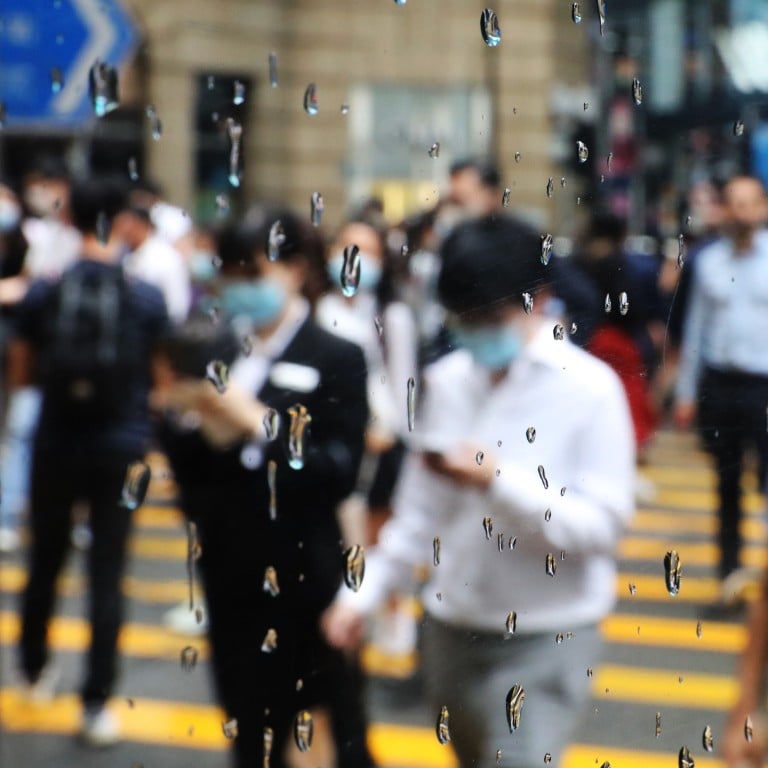
Hong Kong unemployment hits 15-year high, with 5.9 per cent out of work
- Jobless rate rises for eighth month in a row, surpassing the figure from the aftermath of the global financial crisis
- Labour market worsening with large parts of the city’s economy still ‘in the doldrums’, minister says
Hong Kong’s unemployment rate has climbed to its highest level in 15 years, hitting 5.9 per cent, although the rate of increase is slowing.
The jobless rate has climbed for eight straight months as the coronavirus pummels the economy deeper into recession following months of social unrest.
Official figures released on Tuesday showed the city’s jobless rate was up 0.7 percentage points for the March to May period, compared to 5.2 per cent in the previous period. It is now the highest since early 2005, surpassing the figure recorded in the wake of the global financial crisis in 2008.
While the pace of increase has shown signs of slowing, after previously rising 1 percentage point for the February to April period, a government official warned the rate was likely to continue climbing next month.
Jobless rate will be worse than after financial crisis, Paul Chan warns
“The labour market showed further deterioration in March to May 2020 as a wide range of economic activities stayed in the doldrums,” Secretary for Labour and Welfare Law Chi-kwong said.
The number of unemployed in the city increased by about 27,900 – from 202,500 in February to April to 230,400 in March to May. Over the same period, the number of underemployed also increased by about 16,500, to 135,100, or 3.5 per cent.

Law warned it would take time for Hong Kong’s economy to return to normal, even with the local Covid-19 situation improving. “The external environment also remains difficult as the pandemic continues to weigh on the global economy,” he said. “Thus the labour market will still face pressure in the near term, yet the pace of deterioration may decelerate.”
He added: “To preserve the vitality of the economy, the government has rolled out relief measures of unprecedented scale, including a series of measures on job retention and job creation. These measures should help keep workers in employment.”
Speaking to reporters in a separate briefing, Law warned the chances of the jobless rate surpassing 6 per cent for the April to June period could be high. Hong Kong’s unemployment rate has been steadily climbing since last September, when it stood at 2.9 per cent. An all-time high of 8.5 per cent was recorded in June 2003 against the backdrop of the severe acute respiratory syndrome (Sars) epidemic.
The local economy was dealt another blow when the coronavirus reached Hong Kong in late January.

“We hope the economic recession and our unemployment rate will not be worse than in 2003 during Sars, when it reached approximately 8 per cent,” she said.
Lam said the government’s wage subsidy scheme – which supported employers by covering 50 per cent of workers’ salaries for six months, capped at HK$9,000 per month – had received 168,000 applications, involving 66 per cent of all eligible employers in Hong Kong.
So far the government has approved 59,500 bids, worth a total of HK$11.4 billion and covering more than 490,000 employees.
Lam said the government had estimated that 256,000 employers qualified for the scheme. It would next week update the list of those taking part in the interests of transparency.
To receive the first tranche of subsidies, employers must promise the number of employees on their payroll between June and August is not smaller than it was in March, including those on unpaid leave.
All the money handed to employers must be given to staff, and bosses must promise not to cut their workforce over the subsidy period.
‘Hong Kong firms that sack workers but demand subsidies face cash penalties’
Each worker, on average, is in line for a HK$23,200 subsidy from the government between June and August.
Economists and labour unionists did not expect significant improvements in the job market unless border restrictions imposed due to Covid-19 were lifted. “The government’s employment support scheme can help workers keep their jobs for a period of time, but if Covid-19 does not go and we cannot reopen our borders to tourists, the job market could turn worse again after the scheme is finished,” said Dr Billy Mak Sui-choi, an economist at Baptist University.
We cannot rely solely on boosting domestic consumption to keep up the job market
Professor Terence Chong Tai-leung, executive director of Chinese University’s Lau Chor Tak Institute of Global Economics and Finance, shared a similar view, saying: “Hong Kong is an externally oriented economy. We cannot rely solely on boosting domestic consumption to keep up the job market.”
Unionist legislator Luk Chung-hung, of the Federation of Trade Unions, also urged the government to reopen borders sooner to bring in more mainland tourists. He also urged the government to issue shopping vouchers to residents to boost the economy.
Meanwhile, the Social Welfare Department on Tuesday released figures showing a slower rate of increase in the number of people relying on comprehensive social security assistance because they were out of work. Unemployment cases increased 1.4 per cent to 18,427 cases in May, compared with a 24 per cent rise in April.


